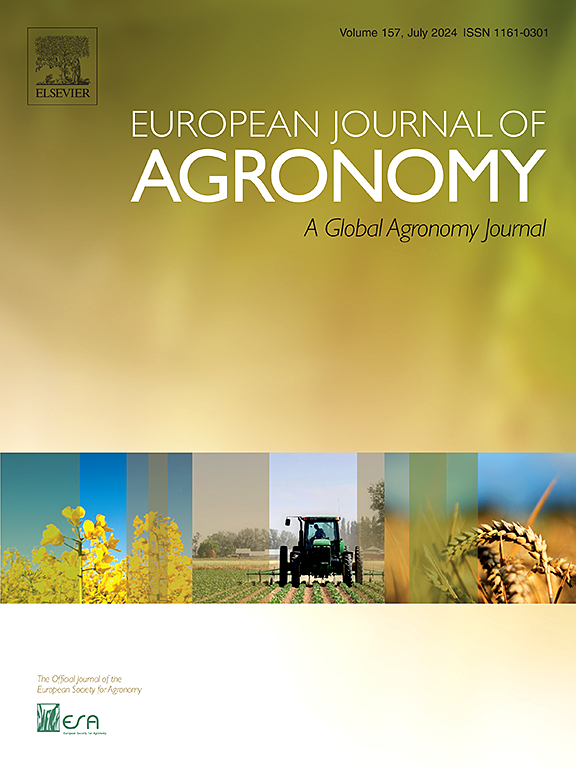An innovative integrated management strategy drives sustainable vegetable production in southwest China: Higher yield with reduced net GHG emissions
IF 4.5
1区 农林科学
Q1 AGRONOMY
引用次数: 0
Abstract
Intensive vegetable production in Southwest China is characterized by excessive fertilizer inputs, low nutrient use efficiency and high environmental costs. Thus, effective management strategies for sustainable vegetable production need to be explored. A two-year field experiment (2023–2024) was conducted to comprehensively evaluate the effects of different nutrient management strategies on vegetable yield and quality, net greenhouse gas (GHG) emissions, soil carbon (C) sequestration, and net ecosystem economic benefits (NEEB) from an open-field pepper (Capsicum annuum L.) production system in Southwest China. The six treatments included a control without fertilizer (CK), farmers’ conventional practice (FP), three optimized nutrient management strategies (optimized NPK fertilizer, OPT; single-dose application of controlled release urea, CRU; and high-efficiency water-soluble fertilizer with nitrification inhibitor, WSF+NI), and an innovative integrated knowledge and product strategy (IKPS, which integrates optimized nutrient management, soil health and improved crop management). Compared with the FP treatment, the optimized nutrient management strategy decreased the fertilizer inputs by 43–62 %, increased the average pepper yield by 2.1–9.6 % and the nutrient use efficiency by 1.7–3.3 times. Compared with these optimized strategies, IKPS further significantly increased the vegetable yield, nutrient uptake and nutrient use efficiency by 12.4–20.8 %, 10.3–62.2 % and 31.9–83.9 %, respectively. Additionally, compared with those under FP, the three optimized nutrient management practices and IKPS significantly decreased the nitrite content in pepper fruits by 13.9–42.4 % and increased the vitamin C content by 60.5–77.6 %. These results indicated a comprehensive improvement in vegetable quality. Moreover, the net GHG emissions in the OPT, CRU, and WSF + NI treatments were reduced by 56.7 %, 72.1 % and 82.7 %, respectively, relative to those in the FP treatment, primarily because of the reduced fertilizer inputs. Compared with the three optimized nutrient management practices, the IKPS further improved soil C sequestration by 29.1–43.0 %, further reduced net GHG emissions by 47.2–78.9 %, and increased the NEEB by 33.2–47.2 %. The highest comprehensive evaluation index (CEI) was achieved with IKPS. These results confirmed its great potential as an innovative integrated management strategy to increase yields, improve economic and environmental benefits, and ultimately achieve sustainability in vegetable production. This study provides a template for sustainable vegetable production practices in subtropical regions, highlighting the importance of the IKPS for achieving carbon neutrality.
创新的综合管理策略推动西南地区蔬菜可持续生产:提高产量,减少温室气体净排放
西南地区蔬菜集约化生产存在肥料投入过多、养分利用效率低、环境成本高的特点。因此,需要探索可持续蔬菜生产的有效管理策略。通过为期2年(2023-2024)的田间试验,综合评价了不同养分管理策略对西南地区露天辣椒生产系统蔬菜产量和品质、温室气体净排放、土壤碳(C)固碳和净生态系统经济效益(NEEB)的影响。6个处理包括无肥对照(CK)、农民常规做法(FP)、3种优化养分管理策略(优化氮磷钾肥、OPT;控释尿素(CRU)单剂量应用;(含硝化抑制剂WSF+NI的高效水溶性肥料),以及创新的集成知识和产品战略(IKPS,将优化的养分管理、土壤健康和改进的作物管理集成在一起)。与FP处理相比,优化后的养分管理策略减少了43 ~ 62 %的肥料投入,提高了2.1 ~ 9.6 %的辣椒平均产量,养分利用效率提高了1.7 ~ 3.3倍。与这些优化方案相比,IKPS进一步显著提高了蔬菜产量、养分吸收和养分利用效率,分别提高了12.4 ~ 20.8 %、10.3 ~ 62.2 %和31.9 ~ 83.9 %。此外,与FP处理相比,3种优化营养管理方式和IKPS处理显著降低了辣椒果实中亚硝酸盐含量13.9 ~ 42.4 %,显著提高了维生素C含量60.5 ~ 77.6 %。这些结果表明蔬菜品质得到了全面改善。此外,与FP处理相比,OPT、CRU和WSF + NI处理的温室气体净排放量分别减少了56.7% %、72.1 %和82.7 %,这主要是由于减少了肥料投入。与3种优化的养分管理方式相比,IKPS进一步提高了29.1 ~ 43.0% %的土壤固碳能力,进一步减少了47.2 ~ 78.9% %的温室气体净排放量,增加了33.2 ~ 47.2% %的NEEB。综合评价指标(CEI)最高的是IKPS。这些结果证实了它作为一种创新的综合管理策略的巨大潜力,可以提高产量,改善经济和环境效益,并最终实现蔬菜生产的可持续性。该研究为亚热带地区的可持续蔬菜生产实践提供了一个模板,强调了IKPS对实现碳中和的重要性。
本文章由计算机程序翻译,如有差异,请以英文原文为准。
求助全文
约1分钟内获得全文
求助全文
来源期刊

European Journal of Agronomy
农林科学-农艺学
CiteScore
8.30
自引率
7.70%
发文量
187
审稿时长
4.5 months
期刊介绍:
The European Journal of Agronomy, the official journal of the European Society for Agronomy, publishes original research papers reporting experimental and theoretical contributions to field-based agronomy and crop science. The journal will consider research at the field level for agricultural, horticultural and tree crops, that uses comprehensive and explanatory approaches. The EJA covers the following topics:
crop physiology
crop production and management including irrigation, fertilization and soil management
agroclimatology and modelling
plant-soil relationships
crop quality and post-harvest physiology
farming and cropping systems
agroecosystems and the environment
crop-weed interactions and management
organic farming
horticultural crops
papers from the European Society for Agronomy bi-annual meetings
In determining the suitability of submitted articles for publication, particular scrutiny is placed on the degree of novelty and significance of the research and the extent to which it adds to existing knowledge in agronomy.
 求助内容:
求助内容: 应助结果提醒方式:
应助结果提醒方式:


